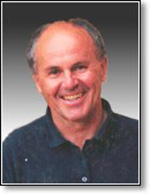Go to
Heinrich Meyr
The Future of Electrical Engineering
17 December 2009, EPFL Polydome
 Heinrich Meyr
Heinrich Meyr
Professor
Institute for Integrated Signal Processing Systems
RWTH Aachen University of Technology , Germany
Webpage
Thursday, 17 December 2009 (11h30-12h15), EPFL Polydôme
A SWOT Analysis of Electrical Engineering
We will make an attempt to present a strength-weakness-opportunity-threat (SWOT) analysis of EE. A SWOT analysis is a proven tool in management to assess a strategy since it forces to systematically collect and classify facts.
Opportunity: The key challenge in engineering of tomorrow is designing and operating increasingly large, complex systems (e.g. communications, power, automotive) where the total is more than the sum of its parts. In these complex systems electronics and signal processing play a dominant role. The problems are too heterogeneous and complex to be solved by a single discipline. They require a truly cross-disciplinary approach.
Strength: EE is among all engineering disciplines uniquely positioned to take a leading role in tackling the above problems. EE students receive a solid education in physics. They are familiar with the modeling of physical system and experimental work to validate the theoretical assumptions. They have an in-depth education in mathematical system theory, information theory and signal processing. They understand computer architecture and software for embedded system. These are core competencies indispensable to the design of complex systems. In fundamental research, EE is uniquely positioned to heavily contributing to the advancement of a mathematical system theory of large systems.
Threat: Cross-disciplinary projects require a large organization to manage them. The structure of these organizations ranges from academic research clusters, government agencies, semi industrial/pure research organization to industry. Collaboration between the various players is a must; however, experience teaches that it is the most difficult task to be accomplished. There is also a substantial danger that large organizations dominate and infringe on the freedom of academic research.
Weakness: In the future the EE departments will undergo substantial change. Areas which have been the pride will be deemphasized while others will become dominant. Change is always painfully slow in faculties.
About the speaker:
Heinrich Meyr received his M.Sc. and Ph.D. from ETH Zurich, Switzerland. He spent over 12 years in various research and management positions in industry before accepting a professorship in Electrical Engineering at Aachen University of Technology (RWTH Aachen) in 1977. He has worked extensively in the areas of communication theory, digital signal processing and CAD tools for system level design for the last thirty years. His research has been applied to the design of many industrial products. At RWTH Aachen he is a co-director of the institute for integrated signal processing system (ISS) involved in the analysis and design of complex signal processing systems for communication applications. He built this institute into one of the internationally-leading research institutions. He was a co-founder of CADIS GmbH (acquired in 1993 by Synopsys) a company which commercialized the tool suite COSSAP. Most recently, he co-founded LISATek Inc., which was acquired by CoWare in February 2003. Dr. Heinrich Meyr serves as CoWare's Chief Scientist and Chairman of its Technical Advisory Board.
Download presentation slides (2.5 MB pdf)
Secondary navigation
- EPFL Workshop on Logic Synthesis and Emerging Technologies
- Luca Amaru
- Luca Benini
- Giovanni De Micheli
- Srini Devadas
- Antun Domic
- Rolf Drechsler
- Pierre-Emmanuel Gaillardon
- Jie-Hong Roland Jiang
- Akash Kumar
- Shahar Kvatinsky
- Yusuf Leblebici
- Shin-ichi Minato
- Alan Mishchenko
- Vijaykrishnan Narayanan
- Ian O'Connor
- Andre Inacio Reis
- Martin Roetteler
- Julien Ryckaert
- Mathias Soeken
- Christof Teuscher
- Zhiru Zhang
- Symposium on Emerging Trends in Computing
- Layout synthesis: A golden DA topic
- EPFL Workshop on Logic Synthesis & Verification
- Luca Amaru
- Luca Benini
- Robert Brayton
- Maciej Ciesielski
- Valentina Ciriani
- Jovanka Ciric-Vujkovic
- Jason Cong
- Jordi Cortadella
- Giovanni De Micheli
- Antun Domic
- Rolf Drechsler
- Henri Fraisse
- Paolo Ienne
- Viktor Kuncak
- Enrico Macii
- Igor Markov
- Steven M. Nowick
- Tsutomu Sasao
- Alena Simalatsar
- Leon Stok
- Dirk Stroobandt
- Tiziano Villa
- Symposium on Emerging Trends in Electronics
- Raul Camposano
- Anantha Chandrakasan
- Jo De Boeck
- Gerhard Fettweis
- Steve Furber
- Philippe Magarshack
- Takayasu Sakurai
- Alberto Sangiovanni-Vincentelli
- Ken Shepard
- VENUE
- Panel on Circuits in Emerging Nanotechnologies
- Panel on Emerging Methods of Computing
- Panel on The Role of Universities in the Emerging ICT World
- Panel on Design Challenges Ahead
- Panel on Alternative Use of Silicon
- Nano-Bio Technologies for Lab-on-Chip
- Functionality-Enhanced Devices Workshop
- More Moore: Designing Ultra-Complex System-on-Chips
- Design Technologies for a New Era
- Nanotechnology for Health
- Secure Systems Design
- Surface Treatments and Biochip Sensors
- Security/Privacy of IMDs
- Nanosystem Design and Variability
- Past Events Archive
Links
Watch the presentations on EPFL TV
